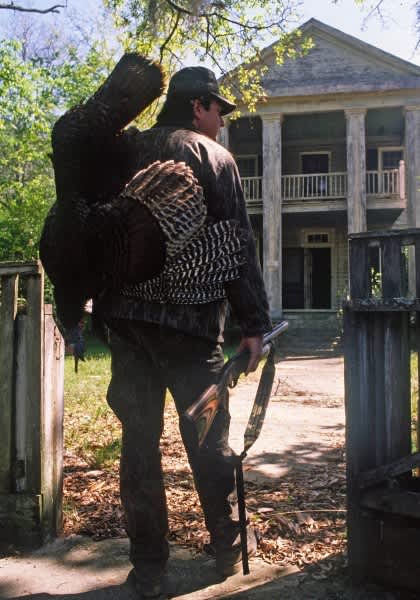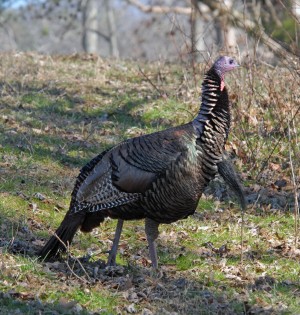What Makes Southern Turkeys So Tough to Take?
John E. Phillips 04.09.13

Author’s note: Eddie Salter of Greenville, Alabama has hunted turkeys for almost 50 years, hosts The Turkey Man on the Pursuit Channel, and is a Pro Staffer for the Down-n-Dirty Outdoors call company and Mossy Oak. This week, we’ve asked Salter to tell Outdoor Hub’s readers about some of the toughest turkeys he ever has tried to take.
I live in Alabama, where some portions of the state never have had closed turkey seasons. The restocking program that was started in the 1950s and 1960s in Alabama was very successful. Our Department of Conservation trapped turkeys from south Alabama and released them in north Alabama, so turkeys throughout the state carried the same genes as the south Alabama turkeys that had been hunted forever. As the turkey population across the state began to grow, so did the number of people hunting the turkeys. Two-year-old turkeys gobble the best, so they usually get wiped out early in the season. The turkeys that don’t gobble very well are the birds that are left to breed. This means most of the turkeys today tend not to gobble very much. Turkeys with aggressive genes don’t live very long in Alabama, so our turkeys have become some of the toughest turkeys on the planet to hunt.
Before I really got into the turkey calling business, I was a barber. If my customers were having a hard time taking a turkey, they told me about it and either gave me permission to hunt that property, or helped me obtain permission from the landowner to hunt there. One of my buddies gave me an old field turkey. The first time I went to this gobbler, I understood why my buddy had asked me to hunt this turkey. When I called to him, the gobbler would run out of the field. But I like turkeys that won’t come to a call, because you have to learn how to hunt them, instead of calling to them.
A friend of mine, David Hale, says, “I believe I bagged more turkeys before I learned how to call.” David is a world-class caller, but he’s first and foremost a world-class hunter. When I saw what was happening with that turkey, I decided to leave my turkey calls at home. Instead of depending on my calling ability, I would learn where this turkey traveled, when he moved, and where he wanted to go. I would get in front of him and let him come to me without calling to him. Many turkey hunters call hunting turkeys instead of calling them “Bushwhacking the turkeys.” I don’t see it that way. I think far more skill and woodsmanship is required to take a turkey without calling than to hear a gobbler from his roost, move in close, call to the bird, and shoot him before 9:00 am–especially an old gobbler.
 This field where this turkey was living had big terraces. When I got out that morning, I saw this bird strutting in the middle of the field on top of one of those terraces. I got on the terrace below him and belly-crawled, peeping over the lip of the terrace to see where he was. Finally, when I got close to the turkey, a hen walked past me within shooting distance. In less than three minutes, that old gobbler walked the same path as the hen, and I was able to take him. When the gobbler went down, I jumped up quickly, ran to the flopping turkey and put my foot on his head. I yelled three times with my diaphragm caller and said, “OK, old boy. You can’t say I didn’t call to you.”
This field where this turkey was living had big terraces. When I got out that morning, I saw this bird strutting in the middle of the field on top of one of those terraces. I got on the terrace below him and belly-crawled, peeping over the lip of the terrace to see where he was. Finally, when I got close to the turkey, a hen walked past me within shooting distance. In less than three minutes, that old gobbler walked the same path as the hen, and I was able to take him. When the gobbler went down, I jumped up quickly, ran to the flopping turkey and put my foot on his head. I yelled three times with my diaphragm caller and said, “OK, old boy. You can’t say I didn’t call to you.”
When you’ve fought the war and you’re losing, you have to pull all the tricks out of your turkey hunting bag to win. I know there are some turkeys you never will take, but turkey hunting isn’t just about calling. You need woodsmanship skills, like knowing when to call and when not to call, when you can move and when not to move, what the turkey will do, and what he won’t do. When you’ve gone through every call you own and still can’t take a turkey, you have to learn how to outsmart him.

